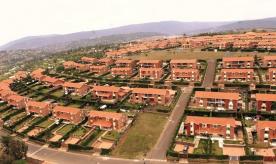Urbanisation in Rwanda: Future driver of growth
- Urbanisation affects where individuals live, what firms produce, and the composition of the local economy.
- Researchers wrote a policy note on key challenges to urbanisation in Rwanda
- They recommended that the Rwandan government should look at urbanisation beyond the strict definition of investment in structures, and should also focus more broadly at rural-urban transformation when considering their urban management strategy.
- The recommendation in the policy note of appointing City Managers for secondary cities in Rwanda was adopted at the National Leadership Retreat.
Urbanisation has been identified as a key aspect of Rwanda’s economic transformation. Sally Murray, a former Senior Policy Economist at the IGC, co-authored a policy note with a World Bank team to inform the Rwandan President’s Office on improvements to the country’s current policies around urbanisation.
The study found that a ‘strict’ definition of urbanisation based on investment in structures understates the true pace and shape of urban land use transformation and densification. By sticking to these stringent definitions, the government may inadvertently neglect emerging informal urban clusters, resulting in fragmented urban areas that may not support economies of scale or agglomeration. The study therefore recommended that as part of revisions to Rwanda’s urban planning code, all plans take into account the true pace and shape of urbanisation.
The study also recommended that policymakers consider the broader rural-urban transformation of Rwanda’s economy when considering urbanisation, rather than just the management of individual towns and cities.
Finally, the research team recommended the appointment of City Managers for Rwanda’s secondary cities. When presented, this recommendation was adopted promptly by the National Leadership Retreat in Kigali.



